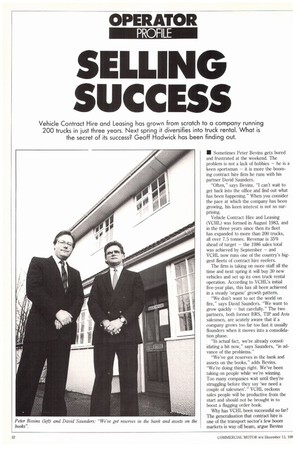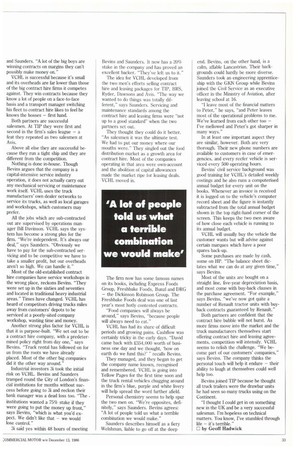SELLING SUCCESS
Page 34

Page 35

If you've noticed an error in this article please click here to report it so we can fix it.
Vehicle Contract Hire and Leasing has grown from scratch to a company running 200 trucks in just three years. Next spring it diversifies into truck rental. What is the secret of its success? Geoff Hadwick has been finding out.
• Sometimes Peter Bevins gets bored and frustrated at the weekend. The problem is not a lack of hobbies — he is a keen sportsman — it is more the booming contract hire firm he runs with his partner David Saunders.
"Often," says Bevins, "I can't wait to get back into the office and find out what has been happening." When you consider the pace at which the company has been growing, his keen interest is not so surprising.
Vehicle Contract Hire and Leasing (VCHL) was formed in August 1983, and in the three years since then its fleet has expanded to more than 200 trucks, all over 7.5 tonnes. Revenue is 35% ahead of target — the 1986 sales total was achieved by September — and VCHL now runs one of the country's biggest fleets of contract hire reefers.
The firm is taking on more staff all the time and next spring it will buy 30 new vehicles and set up its own truck rental operation. According to VCHL's initial five-year plan, this has all been achieved in a steady 'organic' growth pattern.
"We don't want to set the world on fire," says David Saunders. "We want to grow quickly — but carefully." The two partners, both former BRS, TIP and Avis salesmen, are acutely aware that if a company grows too far too fast it usually flounders when it moves into a consolidation phase.
"In actual fact, we're already consolidating a bit now," says Saunders, "in advance of the problems."
"We've got reserves in the bank and assets on the books," adds Bevins. "We're doing things right. We've been taking on people while we're winning. Too many companies wait until they're struggling before they say 'we need a couple of salesmen'." VCHL reckons sales people will be productive from the start and should not be brought in to boost a flagging order book.
Why has VCHL been successful so far? The generalisation that contract hire is one of the transport sector's few boom markets is way off beam, argue Bevins and Saunders. "A lot of the big boys are winning contracts on margins they can't possibly make money on."
VCHL is successful because it's small and its overheads are far lower than those of the big contract hire firms it competes against. They win contracts because they know a lot of people on a face-to-face basis and a transport manager switching his fleet to contract hire likes to feel he knows the bosses — first hand.
Both partners are successful salesmen. At TIP they were first and second in the firm's sales league — a feat they repeated as two salesmen at Avis.
Above all else they are successful because they run a tight ship and they are different from the competition.
Nothing is done in-house. Though Bevins argues that the company is a capital-intensive service industry operation, it does not actually carry out any mechanical servicing or maintenance work itself. VCHL uses the truck manufactuers' own dealer networks to service its trucks, as well as local garages and workshops, which customers may prefer.
All the jobs which are sub-contracted out are supervised by operations manager Bill Davinson. VCHL says the system has become a strong plus for the firm. "We're independent. It's always our deal," says Saunders. "Obviously we have to pay for the sub-contracted servicing and to be competitive we have to take a smaller profit, but our overheads aren't so high. We can handle it."
Most of the old-established contract hire companies have service workshops in the wrong place, reckons Bevins. "They were set up in the sixties and seventies and located in traditional heavy industrial areas." Times have changed. VCHL has heard of competitors driving trucks miles away from customers' depots to be serviced at a poorly-sited company workshop, wasting time and money.
Another strong plus factor for VCHL is that it is purpose-built. "We set out to be a contract hire company, with a predetermined policy right from day one," says Bevins. "Truck rental has followed on for us from the roots we have already placed. Most of the other big companies did it the other way around."
Industrial investors 3i took the initial risk on VCHL. Bevins and Saunders tramped round the City of London's financial institutions for months without success before going to 3i and reckon their bank manager was a dead loss too. 'The.
institutions wanted a 75% stake if they were going to put the money up front," says Bevins, "which is what you'd expect. We didn't like that — we would lose control."
3i said yes within 48 hours of meeting Bevins and Saunders. It now has a 20% stake in the company and has proved an excellent backer, "They've left us to it."
The idea for VCHL developed from the two men's efforts selling contract hire and leasing packages for TIP, BRS, Ryder, Dawsons and Avis. "The way we wanted to do things was totally different," says Saunders. Servicing and maintenance standards among the contract hire and leasing firms were "not up to a good standard" when the two partners set out.
They thought they could do it better. "As salesmen it was the ultimate test. We had to put our money where our mouths were." They singled out the food distribution market as a growth area for contract hire. Most of the companies operating in that area were own-account and the abolition of capital allowances made the market ripe for leasing deals. VCHL moved in.
The firm now has some famous names on its books, including Express Foods Group, Freshbake Foods, Bunzl and DRG — the Dickinson Robinson Group. The Freshbake Foods deal was one of last year's most hotly contested contracts.
"Food companies will always be around," says Bevins, "because people will always need to cat."
VCHL has had its share of difficult periods and growing pains. Cashflow was certainly tricky in the early days. "David came back with 254,000 worth of business one day and we thought, 'how on earth do we fund this?' "recalls Bevins.
They managed, and they began to get the company name known, recognised and remembered. VCHL is going into Yellow Pages for the first time soon and the truck rental vehicles chugging around in the firm's blue, purple and white livery will help spread the word further afield.
Personal chemistry seems to help spur the two men on. "We're opposites, definitely," says Saunders. Bevins agrees: "A lot of people told us what a terrible combination we would make."
Saunders describes himself as a fiery Welshman, liable to go off at the deep end. Bevins, on the other hand, is a calm, affable Lancastrian. Their backgrounds could hardly be more diverse. Saunders took an engineering apprenticeship with the G14.N Group while Bevins joined the Civil Service as an executive officer in the Ministry of Aviation, after leaving school at 16.
"I leave most of the financial matters to Peter," he says, "and Peter leaves most of the operational problems to me. We've learned from each other too — I've mellowed and Peter's got sharper in many ways."
In at least one important aspect they are similar, however. Both are very thorough. Their new phone numbers are available to customers in case of emergencies, and every reefer vehicle is serviced every 500 operating hours.
Bevins' civil service background was good training for VCHL's detailed weekly costings and he also runs a computerised annual budget for every unit on the books. Whenever an invoice is received it is logged on to the vehicle's computer record sheet and the figure is instantly subtracted from the total annual budget shown in the top right-hand corner of the screen. This keeps the two men aware of how close each vehicle is running to its annual budget.
VCHL will usually buy the vehicle the customer wants but will advise against certain marques which have a poor spares back-up.
Some purchases are made by cash, some on HP. "The balance sheet dictates what we can do at any given time," says Bevins.
Most of the units are bought on a straight tine, five-year depreciation basis, and most come with buy-back clauses in the purchase agreement. "For example," says Bevins, "we've now got quite a number of Renault tractor units with buyback contracts guaranteed by Renault."
Both partners are confident that the contract hire bubble will not burst. As more firms move into the market and the truck manufacturers themselves start offering contract hire and leasing agreements, competition will intensify. VCHL seems to relish the challenge_ "We become part of our customers' companies," says Bevins. The company thinks the personal touch will help it endure — their ability to laugh at themselves could well help too.
Bevins joined TIP because he thought all truck trailers were the drawbar units he had seen so many trucks using on the Continent.
"I thought I could get in on something new in the UK and be a very successful salesman. I'm hopeless on technical matters. You know, I've stumbled through life — it's terrible."
[7] by Geoff Hadwick












































































